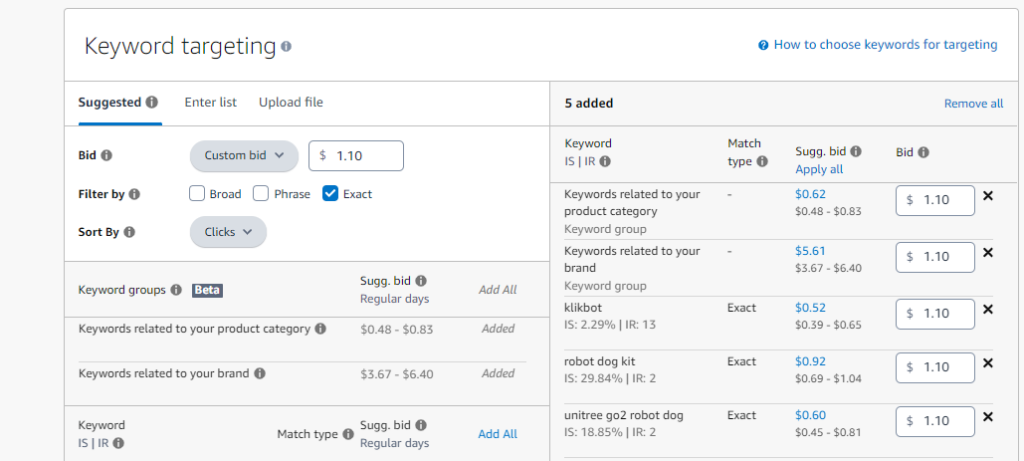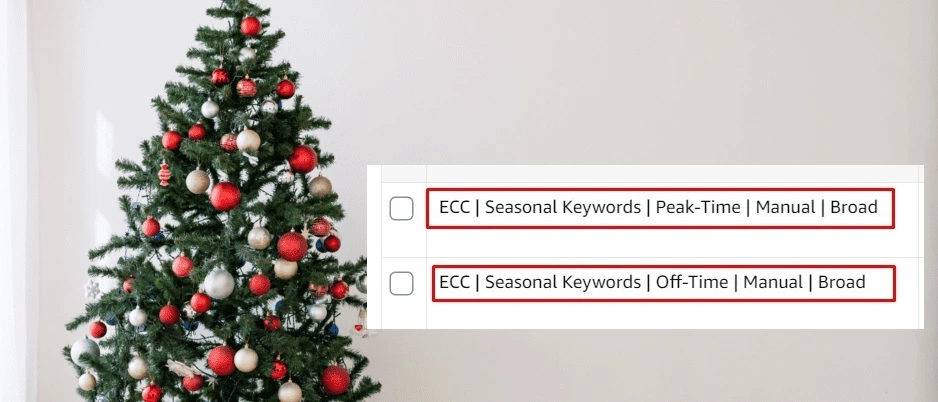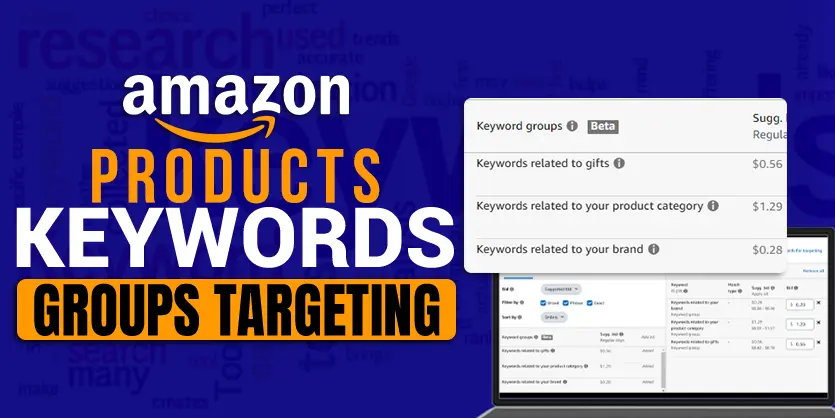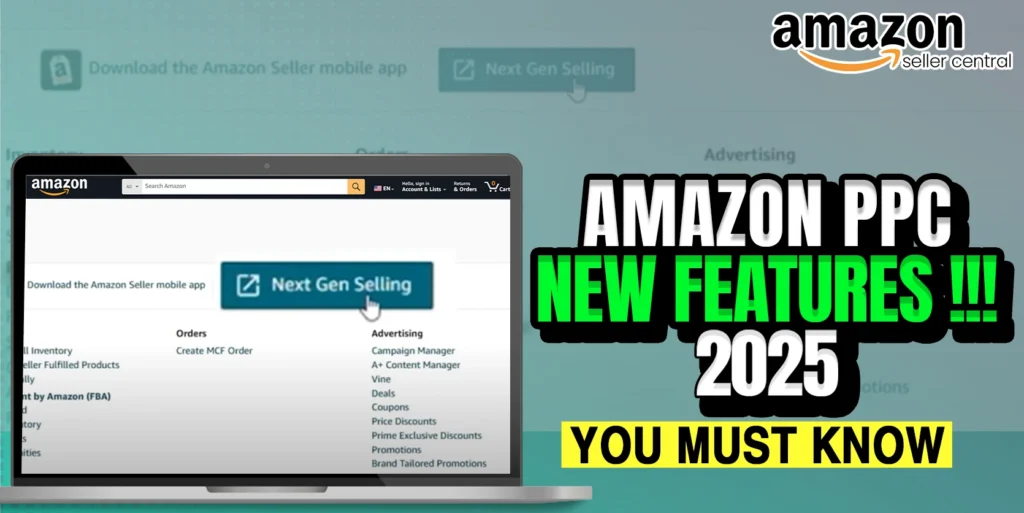In the most competitive marketplace like Amazon, getting your products noticed can be challenging. However, with the right advertising strategies, you can significantly boost your product visibility and drive more sales. One such strategy is using keyword groups in Amazon PPC ads. Amazon has recently introduced new keyword groups for Sponsored Products campaigns, giving sellers more control over their PPC strategy. These keyword groups allow you to target specific sets of keywords related to events like Prime Day, your product category, or your brand, helping you reach more potential customers and improve your campaign performance.
But what exactly are keyword groups, and how can they impact your Amazon PPC ads? In this blog, we’ll explore the concept of keyword groups, starting with a clear definition and then diving into how they function within Amazon’s advertising system. By the end, you’ll have a better understanding of how to use these keyword groups to enhance your advertising efforts and get your products noticed in the crowded Amazon marketplace.
In this blog, We Will Cover
Stop spending precious time searching for the right keywords for your Amazon ad campaigns. Instead, leverage Amazon’s new “Keyword Groups” feature to enhance your targeting and connect with a broader audience. This feature offers highly relevant keywords tailored to your product category, making it easier to implement effective marketing strategies. By utilizing these suggested keywords, you can capture a larger market share and maximize your business opportunities, especially during key events.
- What are the keyword groups in Amazon-sponsored ads?
- How do keyword groups work?
- Different Types of Keyword Groups
- How to Use Keyword Groups Effectively
- How to create effective keyword groups
1. Keyword Groups in Amazon Sponsored Ads
In Amazon Sponsored Ads, a keyword group is a structured collection of keywords you use to target your ads within a specific campaign. This approach allows you to organize and manage your keywords more effectively. Rather than handling a vast number of keywords all at once, you can group similar keywords, making your campaigns more manageable, which can help you to boost the CTR by targeting the exact right KW for your Amazon PPC Ads.

By organizing your keywords into groups, you can ensure that your ads are shown to the right audience based on their search queries. Instead of managing hundreds of keywords in a single campaign, you can break them down into smaller, more manageable groups. It becomes easier to track the performance of specific sets of keywords. You can see which groups are performing well and which ones need adjustments.
2. How Keyword Groups Work
A keyword group in Amazon Sponsored Ads is like a smart way to organize and target your ads using specific sets of keywords. First, start by setting up your campaign and creating ad groups. Each ad group will include a collection of keywords related to the products you’re promoting. When someone searches for terms that match your keywords, your ads become eligible to show up in the search results.

You can set bids for each keyword group, deciding how much you’re willing to pay per click. Then, Amazon uses your bids and the relevance of your keywords to determine where and when your ads appear.
Next, keep an eye on how each keyword group is performing. Look at metrics like clicks, impressions, and conversions to see what’s working. Based on this data, you can adjust your bids and refine your keywords to improve your results. Regularly review and tweak your keyword groups—adding new keywords, removing underperformers, and adjusting bids—to keep your campaigns running smoothly.
3. Keyword Groups For Effective PPC Ads
Different type of keyword grouping for Amazon PPC Ads, like Event-based keywords target specific events, holidays, or seasonal occasions. These are useful for capturing the attention of customers actively searching for products related to these events. For instance, keywords like “Prime Day deals” or “Black Friday discounts” can help you reach shoppers looking for special offers during peak shopping periods.
a) Event-Based Amazon PPC Keywords
Event-based keywords in sponsored ads are specific keywords related to events, holidays, or seasonal occasions. These keywords help you target your ads around particular times when customers are actively searching for products related to those events. For example, a keyword like “Prime Day deals” can be effective if it aligns with your offerings.

High competition during events like Prime Day makes it tough to stand out, and shoppers searching for terms like “Prime Day deals” may not be specifically interested in your product, leading to lower conversion rates.
Instead of focusing on these high-competition, short-term keywords, it’s better to target long-tail, product-specific keywords. This approach often provides better results by reaching customers who are more likely to be interested in your specific product.
b) Gift-related PPC Keywords
Gift-related keywords are used by customers who are searching for products to give as gifts on special occasions. These keywords often include references to specific events or holidays, such as Father’s Day, Mother’s Day, or birthdays. By targeting gift-related keywords, you align your ads with customers looking for products suitable for these occasions.
When using gift-related keywords, Amazon will display your ads for searches associated with gifts. For example, if your product is ideal for gifting during these events, targeting keywords like “Father’s Day gifts” or “birthday presents” can help you reach shoppers actively seeking out products for special occasions.
c) Keywords Related to the Product Category
Targeting keywords related to your product category focuses on popular terms shoppers use to find products within that specific category. This approach can significantly boost your ad impressions and help you reach a broader audience.
However, it’s important to monitor the search terms that trigger your ads. With broad targeting within the category, you might encounter irrelevant keywords that don’t match your product. To refine your targeting, use negative keywords to exclude terms that are not relevant to your offering.

For instance, if you sell vitamin D baby drops and target the keyword “vitamin D,” your ads might also appear for searches related to tablets or gummies. To ensure your ads are seen by those specifically interested in drops, add negative keywords like “tablets” and “gummies” to filter out unrelated searches and focus on your product niche.
d) Keywords Related to Your Brand
Keywords related to your brand focus on terms customers use when searching specifically for your brand name. This approach is particularly effective for established brands with strong market recognition, as it helps capture customers who are already familiar with your brand. For newer sellers, this strategy may be less effective since your brand may not yet be widely known.
e) Keywords Related to Your Landing Page
Keywords related to your landing page target a set of relevant terms designed to drive traffic to your store. This approach aims to attract customers who are searching for products or information that aligns with the content of your landing page.
Over the past 30 days, we ran ads and received a total of 78 customer searches, but only one of these searches converted into a sale.
Once we analyzed the search terms, we found that some of the searches were completely irrelevant to my product, which triggered my ads unnecessarily.
Based on this experience, we recommend that if you choose to use this targeting group, you should regularly check the search terms and add negative keywords to filter out irrelevant searches.
4. How to Create Effective Keyword Groups
- Relevance: Ensure that the keywords within each group are closely related to each other and to the products you’re advertising. This improves the relevance of your ads to search queries.
- Specificity: Use specific keywords that clearly define your product’s characteristics, materials, or benefits. This helps in targeting a more precise audience.
- Branding: Include your brand’s name in some of the keywords to increase impressions on searches related to your brand. This can help in capturing brand-specific traffic.
- Avoid Keyword Dumping: Don’t overload a single group with too many keywords. This can dilute the effectiveness of your targeting and reduce ad performance.
- Use Negative Keywords: Exclude certain keywords to prevent your ads from appearing in irrelevant searches. This helps in refining your targeting and improving ad relevance.
- Monitor and Optimize: Regularly review the performance of your keyword groups. Make adjustments as needed to improve results, ensuring your campaigns remain effective and relevant.
Conclusion!
To sum up, the use of keyword groups in Amazon-sponsored ads can be a transformative strategy for any seller looking to enhance their advertising efforts. You can target your ads more precisely, organize your campaigns more effectively, and ultimately drive better performance by understanding the keyword groups. Different types of keyword groups allow for varied targeting approaches, ensuring that your ads reach the most relevant audience. By utilizing keyword groups, sellers can benefit from improved ad performance, increased visibility, and higher sales.
Here, at Ecomclips, we have been helping many Amazon sellers boost their sales and capture the market share with both PPC and organic SEO. If you need any help boosting your Amazon sales or making growth on your brand, please don’t hesitate to mail us at our email address info@ecomclips.com. Also, if you need an Amazon store or account audit for both PPC Ads and listings SEO, you can let us know via our email address, and we will provide you with a free account audit.
As an Amazon advertising agency, we have a dedicated Amazon Ads Certified expert team who can build an Amazon advertising strategy for your account whether it’s a newly launched or a running Amazon brand to build traffic and conversion.
Additionally, if you need any assistance, please reach out to us through the comment box. We are here to assist you in managing PPC advertisements to improve your profit, so we offer a personalized approach to our service.



